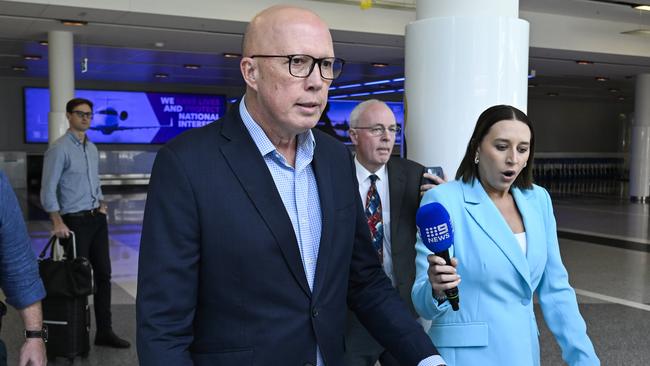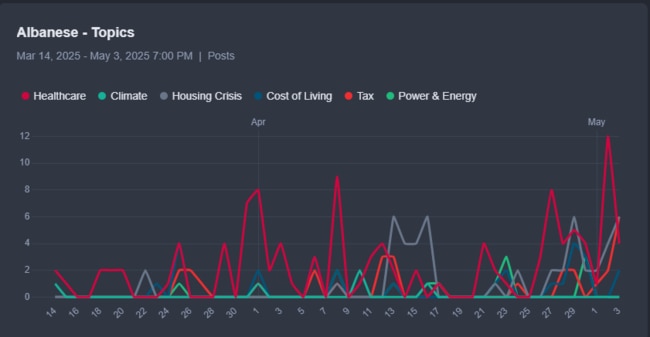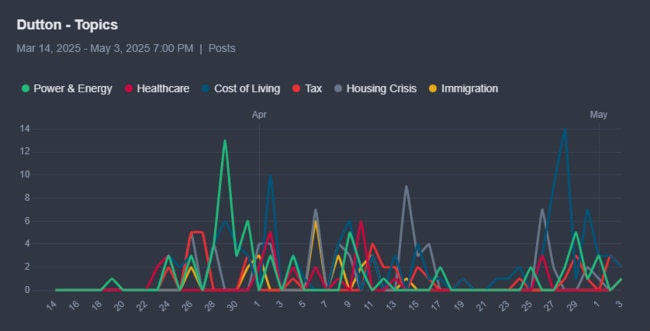Peter Dutton’s election campaign on Instagram, TikTok, Facebook exposed out-of-touch Liberal Party
Did the Liberal Party think hiring the same digital agency that helped propel Scott Morrison to his ‘miracle’ election win would work similar magic?

If a week is a long time in politics, what’s six years? Apparently not a lot to the Coalition, which hired the same social media firm that helped Boris Johnson orchestrate Brexit.
Hiring New Zealand-based Topham Guerin probably fuelled the Liberal confidence, which melted as quickly as the wax on Icarus’s wings when Australians went to the polls last weekend.
Peter Dutton crashed to the ground with such a thud he lost his seat, while the Liberals were all but banished from Australia’s cities in the bruising defeat.
It was Australia’s most social media-focused election, as both major parties attempted to connect with younger voters. But, the Coalition’s strategy – which was peppered with Star Wars memes and dancing bananas – failed to resonate.
Why? Data provided exclusively to this masthead reveals the Coalition posted too much, creating a sense of chaos, compared with Labor’s more focused strategy.
Anthony Albanese’s various social media accounts posted 470 times in that time frame for 1.7 million engagement actions (likes, shares and comments), while Mr Dutton’s accounts posted 647 times for 1.5 million engagements, according to global media monitor Meltwater.
Meltwater vice-president Australia, New Zealand and Southeast Asia Ross Candido said the result speaks to the importance of clarity when campaigning online.
“If you look at Albanese engagement versus Dutton, even though Albanese posted significantly less, he had more engagement,” he said. “That speaks to the quality of the content, the resonance with the voters was significantly higher for Albanese.”
Mr Candido said the “chaotic” nature of Mr Dutton’s social media activity was far less effective than the Prime Minister’s.
“Albanese was a lot more consistent, especially around healthcare and Medicare, and he ran on those narratives … consistently as the main theme for his campaign, where, in the data, it’s pointing to the fact Dutton was maybe jumping around a little bit too much.
“The more consistent you are, the more easy it is to digest.”


With more millennials and members of Gen Z – raised in the internet age, the most savvy, BS-sniffing users of social media – voting than ever before, the Liberals’ poorer online showing indicates the game is not the same as it was when memes aimed at older voters worked in favour of Scott Morrison and Mr Johnson in recent election cycles.
Mr Candido said trying to appeal to younger voters through memes hurt the Coalition more than it hurt Labor, which also used memes to appeal to the growing young-voter bloc.
“It’s quite interesting, the area where the Coalition had higher engagement (than Labor) was the ‘memetic’,” he said.
“Not all engagement is made equal (and) that point is coming through in that the Liberals did have high engagement on platforms like TikTok. But when it comes to memes, we know that that is a completely different category of content, and that high engagement on those could potentially be creating a caricature of the party as opposed to (bringing aboard) swinging voters.”
The Liberals posted many memes throughout the campaign, including several Star Wars-related riffs, given their long history of being memed.
It didn’t resonate with voters, however, which was unsurprising to tech expert Ming Johanson.
Ms Johanson, a 20-year marketing veteran and chief executive of digital marketing firm Marketing Jumpstart, said the Liberals’ approach to their social media campaign made them seem like “a tourist on the internet”.
“They’re not native to these platforms,” she said. “You’re talking to a generation of kids who can see you trying, it’s like your parent trying to be cool on the internet.”
Ms Johanson said the issues highlighted by Mr Dutton and the Liberals throughout the campaign simply did not speak to youth voters online.
“Their policies were based around the fuel pump and owning houses and nuclear power plants,” she said.
“You’re talking to a younger audience. If you were talking to an older audience, maybe (it works), but you’re talking to a younger audience and trying to convince them that nuclear power plants are the future.”
The rising influence of social media personalities on younger people was also leveraged by the two party leaders, with Mr Albanese’s interview with millennial and Gen Z influencer phenom – and outspoken Greens supporter – Abbie Chatfield causing controversy, where the Electoral Commission had to review her podcast interview to make sure it met transparency rules.
Revelations that independent MP Allegra Spender paid influencers to create content to post online also raised the hackles of those who believe such content should be clearly marked as being paid for.
When asked by this masthead if there were any plans to change policy around influencers being paid by political parties to generate online content without influencers having to declare it to followers, officials in the Prime Minister’s office did not comment.
Chatfield’s management also did not comment by deadline.
Monash University media and journalism professor Robbie Fordyce said podcasting will remain “a key site for campaigning now and into the future”.
“The important thing about podcasts is how centralised they are,” he said. “Podcasts are often attitudinal, tribal and – to a degree – aligned to demographics, which is really necessary for reach and engagement.
“I’d say that even beyond their commentary on Australian politics, they’re impacting attitudes and expectations about what governments could or should do.”
Dr Fordyce echoed the importance of consistency online, and how the Coalition’s “unforced errors” with key party policy gave Labor a distinct advantage on offence.
“In this context, the message is consistency, consistency, consistency. The Coalition had a number of unforced errors in terms of their consistencies on key policies, which provided useful ammunition for the ALP in attack,” he said.
“In particular, nuclear, tax and work-from-home matters seemed almost ad hoc at times.
“The Coalition’s inconsistencies, whether small or large, were important for online communities and influencers to develop their own attacks and commentary on these issues.
“We’re seeing more skilful work by the general public in developing content reels and video essays as these platforms provide better tools for editing and content development.”






To join the conversation, please log in. Don't have an account? Register
Join the conversation, you are commenting as Logout